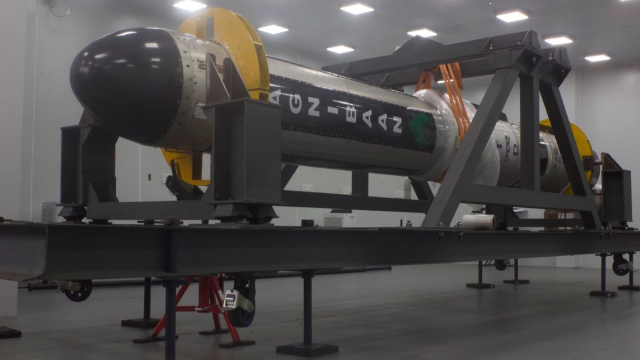Agnibaan SOrTeD
Agnikul Cosmos, an Indian aerospace firm, is poised to achieve a significant milestone by becoming the country’s first private entity to design, develop, and launch a liquid-fueled rocket. Known as ‘Agnibaan SOrTeD’ (SubOrbital Technological Demonstrator), the maiden rocket is set to undergo suborbital testing in the coming weeks. This launch is essential for startups to validate rocket systems before embarking on more ambitious projects.
Agnibaan SOrTeD is driven by Agnikul’s patented Agnilet engine, a 3D-printed, single-piece, 6kN semi-cryogenic engine. Unlike traditional rockets, it will launch vertically and follow a predetermined trajectory while executing precise maneuvers. Agnikul’s progress was acknowledged by ISRO and IN-SPACe officials during the launch vehicle’s unveiling. The firm’s mission aligns with democratizing space exploration through accessibility and cost-effectiveness.
What distinguishes Agnikul Cosmos in India’s space industry?
Agnikul Cosmos is on the verge of becoming India’s pioneering private entity to independently design, develop, and launch a liquid-fueled rocket. This marks a significant achievement as liquid-fueled rockets are more intricate than solid-fueled ones, reflecting Agnikul’s technical prowess.
What purpose does the suborbital launch of ‘Agnibaan SOrTeD’ serve?
Suborbital launches like ‘Agnibaan SOrTeD’ serve as crucial testing platforms for startups to validate their rockets and subsystems. These launches pave the way for more complex missions by ensuring the viability and reliability of the technology.
What is unique about Agnilet, the engine propelling ‘Agnibaan SOrTeD’?
Agnikul’s ‘Agnibaan SOrTeD’ is powered by the Agnilet engine, which is an entirely 3D-printed, single-piece, 6kN semi-cryogenic engine. This innovative propulsion technology showcases Agnikul’s commitment to pushing the boundaries of rocket design and manufacturing.
How does ‘Agnibaan SOrTeD’ differentiate itself from traditional rockets during liftoff?
Unlike traditional rockets that launch from guide rails, ‘Agnibaan SOrTeD’ will take off vertically and follow a predefined trajectory while executing precise maneuvers mid-flight. This vertical liftoff approach demonstrates Agnikul’s innovative approach to rocket launch.
How does Agnikul Cosmos contribute to democratizing space exploration?
Founded in 2017 by IIT Madras alumni, Agnikul Cosmos aims to democratize space exploration by making it accessible and cost-effective. Their achievements reflect this mission by progressing towards independent rocket launches despite the engineering complexities involved.
How does Agnikul Cosmos’s progress compare to the Indian space agency ISRO?
While ISRO is also working on semi-cryogenic engines, Agnikul’s Agnilet engine is specifically designed for its liquid-fueled rocket. ISRO’s SCE-2000 aims to enhance India’s rocket lifting capacity, emphasizing the different goals and scales of the two entities’ projects.
Month: Current Affairs - August, 2023
Category: Science & Technology Current Affairs







